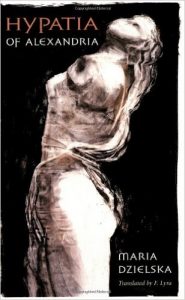No written works widely recognized by scholars as Hypatia of Alexandria’s own have survived to the present time. Many of the works commonly attributed to her are believed to have been collaborative works with her father, Theon Alexandricus. This kind of authorial uncertainty is typical for female philosophers in antiquity, making her the perfect focus of our sixth Theme Thursday.
Maria Dzielska explores some truths in Hypatia of Alexandria: Revealing Antiquity, originally published in 1995. From the book cover: ”
 Hypatia―brilliant mathematician, eloquent Neoplatonist, and a woman renowned for her beauty―was brutally murdered by a mob of Christians in Alexandria in 415. She has been a legend ever since. In this engrossing book, Maria Dzielska searches behind the legend to bring us the real story of Hypatia’s life and death, and new insight into her colorful world.
Hypatia―brilliant mathematician, eloquent Neoplatonist, and a woman renowned for her beauty―was brutally murdered by a mob of Christians in Alexandria in 415. She has been a legend ever since. In this engrossing book, Maria Dzielska searches behind the legend to bring us the real story of Hypatia’s life and death, and new insight into her colorful world.
Historians and poets, Victorian novelists and contemporary feminists have seen Hypatia as a symbol―of the waning of classical culture and freedom of inquiry, of the rise of fanatical Christianity, or of sexual freedom. Dzielska shows us why versions of Hypatia’s legend have served her champions’ purposes, and how they have distorted the true story. She takes us back to the Alexandria of Hypatia’s day, with its Library and Museion, pagan cults and the pontificate of Saint Cyril, thriving Jewish community and vibrant Greek culture, and circles of philosophers, mathematicians, astronomers, and militant Christians. Drawing on the letters of Hypatia’s most prominent pupil, Synesius of Cyrene, Dzielska constructs a compelling picture of the young philosopher’s disciples and her teaching. Finally she plumbs her sources for the facts surrounding Hypatia’s cruel death, clarifying what the murder tells us about the tensions of this tumultuous era.”

